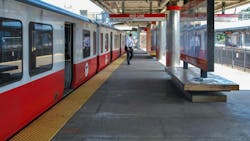MBTA to launch Narcan pilot on Red Line
The Massachusetts Bay Transportation Authority (MBTA) is set to launch a Public Access Naloxone (Narcan) Pilot on the Red Line. In the coming weeks, Narcan will be available to the public at Quincy Center, Ashmont, Andrew, South Station, and Harvard, Mass.
“It’s clear that Narcan saves lives and we are proud to lead the way as one of the six transit entities that have joined the White House’s ‘The Challenge to Save Lives from Overdose’ initiative. Given the role our stations play in the communities with the thousands that traverse them, it makes them ideal pilot locations to include as part of this project,” said MBTA General Manager and CEO Phillip Eng. “Narcan is proven to save lives and while our Transit Police officers carry Narcan, this pilot will soon make it more readily available at five Red Line stations for any members of the public who understand how to administer it as well. Information regarding Narcan and its use will be prominently displayed alongside the Narcan locations. We thank our state partners for funding this pilot, the Harvard College Overdose Prevention and Education Students for their ideas, Sen. [John] Keenan (D-MA) for his support and the MBTA Policy, Stations, and Red Line Operations teams for their diligent work on deploying these cabinets.”
The purpose of this pilot is to increase public access to lifesaving medication that can reverse an opioid overdose, taking advantage of the MBTA’s centrally located and well-trafficked transit stations along the Red Line. Three freestanding and unalarmed cabinets containing two doses of Naloxone will be available at each station, along with signage in English, Spanish and Chinese on how to recognize an opioid overdose, how to administer Narcan and how to contact emergency assistance. The cabinets will be installed in the unpaid and paid lobby areas, as well as near or inside publicly accessible station restrooms.
MBTA staff will perform routine checks on the cabinets, record-keeping and maintenance of the cabinets as needed. As a public access pilot, MBTA staff will not receive specialized training or be expected to administer Narcan. However, local health organizations provide free Narcan administration training and overdose education and training. The Commonwealth provides information about how to access education and training and how to access Narcan via their Harm Reduction Program Locator. MBTA says Transit Police Officers also currently carry Narcan and are trained on how to use it.
The MBTA will share information about the program with community-based organizations within the Red Line service area, including local health organizations to increase awareness of the availability of Narcan at Red Line stations and how the public can sign up for free Narcan administration training.
The program is funded through $95,000 in earmarked funds as part of the Commonwealth’s Fiscal Year 2024 budget connected to the Massachusetts Department of Public Health’s statewide strategy of promoting harm reduction efforts and community-based harm reduction services. The remaining Red Line stations will be evaluated for installation at the end of the pilot phase.
“Overdose deaths are preventable. Making naloxone more accessible and available where people need it most, including in these Red Line stations, will help save lives. The pilot builds on our public health focus on expanding access to harm reduction resources across Massachusetts,” said Massachusetts Department of Public Health Commissioner Robbie Goldstein, MD, PhD.
